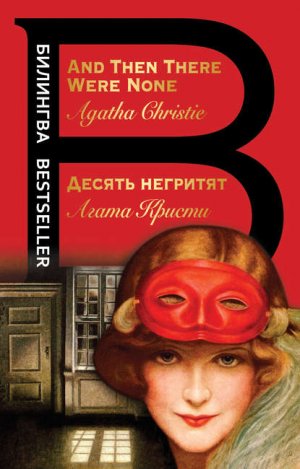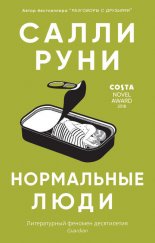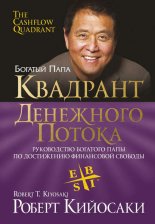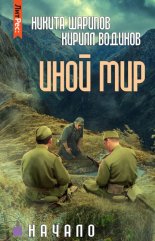Äåñÿòü íåãðèòÿò / And Then There Were None Êðèñòè Àãàòà

She smiled to herself. She went in at the front door. The house, too, felt strangely peaceful.
Vera thought: «Ordinarily one wouldn’t care to sleep where there’s a dead body in practically every bedroom!»
Should she go the kitchen and get herself something to eat?
She hesitated a moment, then decided against it. She was really too tired…
She paused by the dining-room door. There were still three little china figures in the middle of the table.
Vera laughed. She said:
«You’re behind the times, my dears.»
She picked up two of them and tossed them out through the window. She heard them crash on the stone of the terrace.
The third little figure she picked up and held in her hand. She said:
«You can come with me. We’ve won, my dear! We’ve won!»
The hall was dim in the dying light.
Vera, the little Soldier clasped in her hand, began to mount the stairs. Slowly, because her legs were suddenly very tired.
«One little Soldier boy left all alone.» How did it end? Oh, yes! «He got married and then there were none.»
Married… Funny, how she suddenly got the feeling again that Hugo was in the house…
Very strong. Yes, Hugo was upstairs waiting for her.
Vera said to herself:
«Don’t be a fool. You’re so tired that you’re imagining the most fantastic things…»
Slowly up the stairs…
At the top of them something fell from her hand, making hardly any noise on the soft pile carpet. She did not notice that she had dropped the revolver. She was only conscious of clasping a little china figure.
How very quiet the house was. And yet – it didn’t seem like an empty house…
Hugo, upstairs, waiting for her…
«One little Soldier boy left all alone… What was the last line again? Something about being married – or was it something else?»
She had come now to the door of her room. Hugo was waiting for her inside – she was quite sure of it.
She opened the door…
She gave a gasp…
What was that – hanging from the hook in the ceiling? A rope with a noose all ready? And a chair to stand upon – a chair that could be kicked away…
That was what Hugo wanted…
And of course that was the last line of the rhyme.
«He went and hanged himself and then there were none…»
The little china figure fell from her hand. It rolled unheeded and broke against he fender.
Like an automaton Vera moved forward. This was the end – here where the cold wet hand (Cyril’s hand, of course) had touched her throat…
«You can go to the rock, Cyril…»
That was what murder was – as easy as that!
But afterwards you went on remembering…
She climbed up on the chair, her eyes staring in front of her like a sleepwalker’s… She adjusted the noose round her neck.
Hugo was there to see she did what she had to do.
She kicked away the chair…
Epilogue
Sir Thomas Legge, Assistant Commissioner at Scotland Yard, said irritably:
«But the whole thing’s incredible!»
Inspector Maine said respectfully: «I know, sir.»
The A. C. went on:
«Ten people dead on an island and not a living soul on it. It doesn’t make sense!»
Inspector Maine said stolidly: «Nevertheless, it happened, sir.»
Sir Thomas Legge said: «Damn it all, Maine, somebody must have killed em.»
«That’s just our problem, sir.»
«Nothing helpful in the doctor’s report?»
«No, sir. Wargrave and Lombard were shot, the first through the head, the second through the heart. Miss Brent and Marston died of cyanide poisoning, Mrs. Rogers died of an overdose of chloral. Rogers’ head was split open. Blore’s head was crushed in. Armstrong died of drowning. Macarthur’s skull was fractured by a blow on the back of the head and Vera Claythorne was hanged.»
The A. C. winced. He said:
«Nasty business – all of it.»
He considered for a minute or two. He said irritably:
«Do you mean to say that you haven’t been able to get anything helpful out of the Sticklehaven people. Dash it, they must know something.»
Inspector Maine shrugged his shoulders.
«They’re ordinary decent seafaring folk. They know that the island was bought by a man called Owen – and that’s about all they do know.»
«Who provisioned the island and made all the necessary arrangements?»
«Man called Morris. Isaac Morris.»
«And what does he say about it all?»
«He can’t say anything, sir, he’s dead.»
The A. C. frowned.
«Do we know anything abut this Morris?»
«Oh, yes, sir, we know about him. He wasn’t a very savoury gentleman, Mr. Morris. He was implicated in that share-pushing fraud of Bennito’s three years ago – we’re sure of that though we can’t prove it. And he was mixed up in the dope business. And again we can’t prove it. He was a very careful man, Morris.»
«And he was behind this island business?»
«Yes, sir, he put through the sale – though he made it clear that he was buying Soldier Island for a third party, unnamed.»
«Surely there’s something to be found out on the financial angle, there?»
Inspector Maine smiled.
«Not if you knew Morris! He can wangle figures until the best chartered accountant in the country wouldn’t know if he was on his head or his heels! We’ve had a taste of that in the Bennito business. No, he covered his employer’s tracks all right.»
The other man sighed. Inspector Maine went on:
«It was Morris who made all the arrangements down at Sticklehaven, Represented himself as acting for ‘Mr. Owen.’ And it was he who explained to the people down there that there was some experiment on – some bet about living on a ‘desert island’ for a week – and that no notice was to be taken of any appeal for help from out there.»
Sir Thomas Legge stirred uneasily. He said:
«And you’re telling me that those people didn’t smell a rat? Not even then?»
Maine shrugged his shoulders. He said:
«You’re forgetting, sir, that Soldier Island previously belonged to young Elmer Robson, the American. He had the most extraordinary parties down there. I’ve no doubt the local people’s eyes fairly popped out over them. But they got used to it and they’d begun to feel that anything to do with Soldier Island would necessarily be incredible. It’s natural, that, sir, when you come to think of it.»
The Assistant Commissioner admitted gloomily that he supposed it was.
Maine said: «Fred Narracott – that’s the man who took the party out there – did say one thing that was illuminating. He said he was surprised to see what sort of people these were. ‘Not at all like Mr. Robson’s parties.’ I think it was the fact that they were all so normal and so quiet that made him override Morris’ orders and take out a boat to the island after he’d heard about the SOS signals.»
«When did he and the other men go?»
«The signals were seen by a party of boy scouts on the morning of the 11th. There was no possibility of getting out there that day. The men got there on the afternoon of the 12th at the first moment possible to run a boat ashore there. They’re all quite positive that nobody could have left the island before they got there. There was a big sea on after the storm.»
«Couldn’t some one have swum ashore?»
«It’s over a mile to the coast and there were heavy seas and big breakers inshore. And there were a lot of people, boy scouts and others on the cliffs looking out towards the island and watching.»
The A. C. sighed. He said:
«What about the gramophone record you found in the house? Couldn’t you get hold of anything there that might help?»
Inspector Maine said: «I’ve been into that. It was supplied by a firm that do a lot of theatrical stuff and film effects. It was sent to U. N. Owen, Esq. c/o Isaac Morris, and was understood to be required for the amateur performance of a hitherto unacted play. The typescript of it was returned with the record.»
Legge said: «And what about the subject matter, eh?»
Inspector Maine said gravely: «I’m coming to that, sir.» He cleared his throat. «I’ve investigated those accusations as thoroughly as I can.»
«Starting with the Rogerses who were the first to arrive on the island. They were in service with a Miss Brady who died suddenly. Can’t get anything definite out of the doctor who attended her. He says they certainly didn’t poison her, or anything like that, but his personal belief if that there was some funny business – that she died as the result of neglect on their part. Says it’s the sort of thing that’s quite impossible to prove.»
«Then there is Mr. Justice Wargrave. That’s O. K. He was the judge who sentenced Seton.»
«By the way, Seton was guilty – unmistakably guilty. Evidence turned up later after he was hanged which proved that beyond any shadow of doubt. But there was a good deal of comment at the time – nine people out of ten thought Seton was innocent and that the judge’s summing up had been vindictive.»
«The Claythorne girl, I find, was governess in a family where a death occurred by drowning. However, she doesn’t seem to have had anything to do with it, and as a matter of fact she behaved very well, swam out to the rescue and was actually carried out to sea and only just rescued in time.»
«Go on,» said the A.C. with a sigh.
Maine took a deep breath.
«Dr. Armstrong now. Well-known man. Had a consulting room in Harley Street. Absolutely straight and aboveboard in his profession. Haven’t been able to trace any record of an illegal operation or anything of that kind. It’s true that there was a woman called Clees who was operated on by him way back in 1925 at Leithmore, when he was attached to the hospital there. Peritonitis and she died on the operating table. Maybe he wasn’t very skillful over the op. – after all he hadn’t much experience – but after all clumsiness isn’t a criminal offence. There was certainly no motive.»
«Then there’s Miss Emily Brent. Girl, Beatrice Taylor, was in service with her. Got pregnant, was turned out by her mistress and went and drowned herself. Not a nice business – but again not criminal.»
«That,» said the A.C, «seems to be the point. U. N. Owen dealt with cases that the law couldn’t touch.»
Maine went stolidly on with his list.
«Young Marston was a fairly reckless car driver – had his license endorsed twice and he ought to have been prohibited from driving, in my opinion. That’s all there is to him. The two names John and Lucy Combes were those of two kids he knocked down and killed near Cambridge. Some friends of his gave evidence for him and he was let off with a fine.
„Can’t find anything definite about General Macarthur. Fine record – war service – all the rest of it. Arthur Richmond was serving under him in France and was killed in action. No friction of any kind between him and the General. They were close friends, as a matter of fact. There were some blunders made about that time – commanding officers sacrificed men unnecessarily – possibly this was a blunder of that kind.“
„Possibly,“ said the A.C.
„Now, Philip Lombard. Lombard has been mixed up in some very curious shows abroad. He’s sailed very near the law once or twice. Got a reputation for daring and for not being over-scrupulous. Sort of fellow who might do several murders in some quiet out-of-the-way spot. „Then we come to Blore.“ Maine hesitated. „He of course was one of our lot.“
The other man stirred.
„Blore,“ said the Assistant Commissioner forcibly, „was a bad hat!“
„You think so, sir?“
The A. C. said: „I always thought so. But he was clever enough to get away with it. It’s my opinion that he committed black perjury in the Landor case. I wasn’t happy about it at the time. But I couldn’t find anything. I put Hams onto it and he couldn’t find anything but I’m still of the opinion that there was something to find if we’d known how to set about it. The man wasn’t straight.“
There was a pause, then Sir Thomas Legge said:
„And Isaac Morris is dead, you say? When did he die?“
„I thought you’d soon come to that, sir. Isaac Morris died on the night of August 8th. Took an overdose of sleeping stuff – one of the barbiturates, I understand. There wasn’t anything to show whether it was accident or suicide.“
Legge said slowly: „Care to know what I think, Maine?“
„Perhaps I can guess, sir.“
Legge said heavily: „That death of Morris’ is a damned sight too opportune!“
Inspector Maine nodded. He said:
„I thought you’d say that, sir.“
The Assistant Commissioner brought down his fist with a bang on the table. He cried out:
„The whole thing’s fantastic – impossible. Ten people killed on a bare rock of an island – and we don’t know who did it, or why, or how.“
Maine coughed. He said:
„Well, it’s not quite like that, sir. We do know why, more or less. Some fanatic with a bee in his bonnet about justice. He was out to get people who were beyond the reach of the law. He picked ten people – whether they were really guilty or not doesn’t matter —»
The Commissioner stirred. He said sharply:
«Doesn’t it? It seems to me —»
He stopped. Inspector Maine waited respectfully. With a sigh Legge shook his head.
«Carry on,» he said. «Just for a minute I felt I’d got somewhere. Got, as it were, the clue to the thing. It’s gone now. Go ahead with what you were saying.»
Maine went on: «There were ten people to be – executed, let’s say. They were executed. U. N. Owen accomplished his task. And somehow or other he spirited himself off that island into thin air.»
The A. C. said: «First-class vanishing trick. But you know, Maine, there must be an explanation.»
Maine said: «You’re thinking, sir, that if the man wasn’t on the island, he couldn’l have left the island, and according to the account of the interested parties he never was on the island. Well, then the only explanation possible is that he was actually one of the ten.»
The A. C. nodded.
Maine said earnestly: «We thought of that, sir. We went into it. Now, to begin with, we’re not quite in the dark as to what happened on Soldier Island. Vera Claythorne kept a diary, so did Emily Brent. Old Wargrave made some notes – dry legal cryptic stuff, but quite clear. And Blore made notes too. All those accounts tally. The deaths occurred in this order: Marston, Mrs. Rogers, Macarthur, Rogers, Miss Brent, Wargrave. After his death Vera Claythorne’s diary states that Armstrong left the house in the night and that Blore and Lombard had gone after him. Blore has one more entry in his notebook. Just two words: ‘Armstrong disappeared.»
«Now, sir, it seemed to me, taking everything into account, that we might find here a perfectly good solution. Armstrong was drowned, you remember. Granting that Armstrong was mad, what was to prevent him having killed off all the others and then committed suicide by throwing himself over the cliff, or perhaps while trying to swim to the mainland?»
«That was a good solution – but it won’t do. No, sir, it won’t do. First of all there’s the police surgeon’s evidence. He got to the island early on the morning of August 13th. He couldn’t say much to help us. All he could say was that all the people had been dead at least thirty-six hours and probably a good deal longer. But he was fairly definite about Armstrong. Said he must have been from eight to ten hours in the water before his body was washed up. That works out at this, that Armstrong must have gone into the sea sometime during the night of the 10th-11th – and I’ll explain why. We found the point where the body was washed up – it had been wedged between two rocks and there were bits of cloth, hair, etc. on them. It must have been deposited there at high water on the 11th – that’s to say round about 11 o’clock A. M. After that, the storm subsided, and succeeding high water marks are considerably lower.»
«You might say, I suppose that Armstrong managed to polish off the other three before he went into the sea that night. But there’s another point and one you can’t get over. Armstrong’s body had been dragged above high water mark. We found it well above the reach of any tide. And it was laid out straight on the ground – all neat and tidy. „So that settles one point definitely. Some one was alive on the island after Armstrong was dead.“»
He paused and then went on.
«And that leaves – just what exactly? Here’s the position early on the morning of the 11th. Armstrong has ‘disappeared’ (drowned). That leaves us three people. Lombard, Blore and Vera Claythorne. Lombard was shot. His body was down by the sea – near Armstrong’s. Vera Claythorne was found hanged in her own bedroom. Blore’s body was on the terrace. His head was crushed in by a heavy marble clock that it seems reasonable to suppose fell on him from the window above.»
The A. C. said sharply: «Whose window?»
«Vera Claythorne’s. Now, sir, let’s take each of these cases separately. First Philip Lombard. Let’s say he pushed over that lump of marble onto Blore – then he doped Vera Claythorne and strung her up. Lastly, he went down to the seashore and shot himself.»
«But if so, woo took away the revolver from him? For that revolver was found up in the house just inside the door at the top of the stairs – Wargrave’s room.»
The A. C. said: «Any fingerprints on it?»
«Yes, sir, Vera Claythorne’s.»
«But, man alive, then —»
«I know what you’re going to say, sir. That it was Vera Claythorne. That she shot Lombard, took the revolver back to the house, toppled the marble block onto Blore and then – hanged herself. „And that’s quite all right – up to a point. There’s a chair in her bedroom and on the seat of it there are marks of seaweed same as on her shoes. Looks as though she stood on the chair, adjusted the rope round her neck and kicked away the chair. „But that chair wasn’t found kicked over. It was, like, all the other chairs, neatly put back against the wall. That was done after Vera Claythorne’s death – by some one else.»
«That leaves us with Blore and if you tell me that after shooting Lombard and inducing Vera Claythorne to hang herself he then went out and pulled down a whacking great block of marble on himself by tying a string to it or something like that – well, I simply don’t believe you. Men don’t commit suicide that way – and what’s more Blore wasn’t that kind of man. We knew Blore – and he was not the man that you’d ever accuse of a desire for abstract justice.»
The Assistant Commissioner said: I agree.
Inspector Maine said: «And therefore, sir, there must have been some one else on the island. Some one who tidied up when the whole business was over. But where was he all the time – and where did he go to? The Sticklehaven people are absolutely certain that no one could have left the island before the rescue boat got there. But in that case —» He stopped.
The Assistant Commissioner said: «In that case —»
He sighed. He shook his head. He leaned forward.
«But in that case,» he said, «who killed them?»
A MANUSCRIPT DOCUMENT SENT TO SCOTLAND YARD BY THE MASTER OF THE EMMA JANE, FISHING TRAWLER
From my earliest youth I realized that my nature was a mass of contradictions. I have to begin with, an incurably romantic imagination. The practice of throwing a bottle into the sea with an important document inside was one that never failed to thrill me when reading adventure stories as a child. It thrills me still – and for that reason I have adopted this course – writing my confession, enclosing it in a bottle, sealing the latter, and casting it into the waves. There is, I suppose, a hundred to one chance that my confession may be found – and then (or do I flatter myself!) a hitherto unsolved murder mystery will be explained.
I was born with other traits besides my romantic fancy. I have a definite sadistic delight in seeing or causing death. I remember experiments with wasps – with various garden pests… From an early age I knew very strongly the lust to kill.
But side by side with this went a contradictory trait – a strong sense of justice. It is abhorrent to me that an innocent person or creature should suffer or die by any act of mine. I have always felt strongly that right should prevail.
It may be understood – I think a psychologist would understand – that with my mental makeup being what it was, I adopted the law as a profession. The legal profession satisfied nearly all my instincts.
Crime and its punishment has always fascinated me. I enjoy reading every kind of detective story and thriller. I have devised for my own private amusement the most ingenious ways of carrying out a murder.
When in due course I came to preside over a court of law, that other secret instinct of mine was encouraged to develop. To see a wretched criminal squirming in the dock, suffering the tortures of the damned, as his doom came slowly and slowly nearer, was to me an exquisite pleasure. Mind you, I took no pleasure in seeing an innocent man there. On at least two occasions I stopped cases where to my mind the accused was palpably innocent, directing the jury that there was no case. Thanks, however, to the fairness and efficiency of our police force, the majority of the accused persons who have come before me to be tried for murder, have been guilty.
I will say here that such was the case with the man Edward Seton. His appearance and manner were misleading and he created a good impression on the jury. But not only the evidence, which was clear, though unspectacular, but my own knowledge of criminals told me without any doubt that the man had actually committed the crime with which he was charged, the brutal murder of an elderly woman who trusted him.
I have a reputation as a hanging judge, but that is unfair. I have always been strictly just and scrupulous in my summing up of a case.
All I have done is to protect the jury against the emotional effect of emotional appeals by some of our more emotional counsel. I have drawn their attention to the actual evidence.
For some years past I have been aware of a change within myself, a lessening of control – a desire to act instead of to judge.
I have wanted – let me admit it frankly – to commit a murder myself. I recognized this as the desire of the artist to express himself! I was, or could be, an artist in crime! My imagination, sternly checked by the exigencies of my profession, waxed secretly to colossal force.
I must – I must – I must – commit a murder! And what is more, it must be no ordinary murder! It must be a fantastical crime – something stupendous – out of the common! In that one respect, I have still, I think, an adolescent’s imagination.
I wanted something theatrical, impossible!
I wanted to kill… Yes, I wanted to kill…
But – incongruous as it may seem to some – 1 was restrained and hampered by my innate sense of justice. The innocent must not suffer.
And then, quite suddenly, the idea came to me – started by a chance remark uttered during casual conversation. It was a doctor to whom I was talking – some ordinary undistinguished G. P. He mentioned casually how often murder must be committed which the law was unable to touch.
And he instanced a particular case – that of an old lady, a patient of his who had recently died. He was, he said, himself convinced that her death was due to the withholding of a restorative drug by a married couple who attended on her and who stood to benefit very substantially by her death. That sort of thing, he explained, was quite impossible to prove, but he was nevertheless quite sure of it in his own mind. He added that there were many cases of a similar nature going on all the time – cases of deliberate murder – and all quite untouchable by the law.
That was the beginning of the whole thing. I suddenly saw my way clear. And I determined to commit not one murder, but murder on a grand scale.
A childish rhyme of my infancy came back into my mind – the rhyme of the ten little Soldier boys. It had fascinated me as a child of two – the inexorable diminishment – the sense of inevitability.
I began, secretly, to collect victims…
I will not take up space here by going into detail of how this was accomplished. I had a certain routine line of conversation which I employed with nearly every one I met – and the results I got were really surprising. During the time I was in a nursing home I collected the case of Dr. Armstrong – a violently teetotal sister who attended on me being anxious to prove to me the evils of drink by recounting to me a case many years ago in hospital when a doctor under the influence of alcohol had killed a patient on whom he was operating. A careless question as to where the sister in question had trained, etc., soon gave me the necessary data. I tracked down the doctor and the patient mentioned without difficulty.
A conversation between two old military gossips in my Club put me on the track of General Macarthur. A man who had recently returned from the Amazon gave me a devastating resume of the activities of one Philip Lombard. An indignant mem sahib in Majorca recounted the tale of the Puritan Emily Brent and her wretched servant girl. Anthony Marston I selected from a large group of people who had committed similar offences. His complete callousness and his inability to feel any responsibility for the lives he had taken made him, I considered, a type dangerous to the community and unfit to live. Ex-Inspector Blore came my way quite naturally, some of my professional brethren discussing the Landor case with freedom and vigour. I took a serious view of his offence. The police, as servants of the law, must be of a high order of integrity. For their word is perforce believed by virtue of their profession.
Finally there was the case of Vera Claythorne. It was when I was crossing the Atlantic. At a late hour one night the sole occupants of the smoking-room were myself and a good-looking young man called Hugo Hamilton.
Hugo Hamilton was unhappy. To assuage that unhappiness he had taken a considerable quantity of drink. He was in the maudlin confidential stage. Without much hope of any result I automatically started my routine conversational gambit. The response was startling. I can remember his words now. He said:
«You’re right. Murder isn’t what most people think – giving some one a dollop of arsenic – pushing them over a cliff – that sort of stuff.» He leaned forward, thrusting his face into mine. He said: «I’ve known a murderess – known her, I tell you. And what’s more I was crazy about her… God help me, sometimes I think I still am… It’s Hell, I tell you – Hell – You see, she did it more or less for me… Not that I ever dreamed. Women are fiends – absolute fiends – you wouldn’t think a girl like that – a nice straight jolly girl – you wouldn’t think she’d do that, would you? That she’d take a kid out to sea and let it drown – you wouldn’t think a woman could do a thing like that?»
I said to him:
«Are you sure she did do it?»
He said and in saying it he seemed suddenly to sober up:
«I’m quite sure. Nobody else ever thought of it. But I knew the moment I looked at her – when I got back – after… And she knew I knew… What she didn’t realize was that I loved that kid…»
He didn’t say any more, but it was easy enough for me to trace back the story and reconstruct it.
I needed a tenth victim. I found him in a man named Morris. He was a shady little creature. Amongst other things he was a dope pedlar and he was responsible for inducing the daughter of friends of mine to take to drugs. She committed suicide at the age of twenty-one.
During all this time of search my plan had been gradually maturing in my mind. It was now complete and the coping stone to it was an interview I had with a doctor in Harley Street. I have mentioned that I underwent an operation. My interview in Harley Street told me that another operation would be useless. My medical adviser wrapped up the information very prettily, but I am accustomed to getting at the truth of a statement.
I did not tell the doctor of my decision – that my death should not be a slow and protracted one as it would be in the course of nature. No, my death should take place in a blaze of excitement. I would live before I died.
And now to the actual mechanics of the crime of Soldier Island. To acquire the island, using the man Morris to cover my tracks, was easy enough. He was an expert in that sort of thing. Tabulating the information I had collected about my prospective victims, I was able to concoct a suitable bait for each. None of my plans miscarried. All my guests arrived at Soldier Island on the 8th of August. The party included myself.
Morris was already accounted for. He suffered from indigestion. Before leaving London I gave him a capsule to take last thing at night which had, I said, done wonders for my own gastric juices. He accepted it unhesitatingly – the man was a slight hypochondriac. I had no fear that he would leave any compromising documents or memoranda behind. He was not that sort of man.
The order of death upon the island had been subjected by me to special thought and care. There were, I considered, amongst my guests, varying degrees of guilt. Those whose guilt was the lightest should, I decided, pass out first, and not suffer the prolonged mental strain and fear that the more cold-blooded offenders were to suffer.
Anthony Marston and Mrs. Rogers died first, the one instantaneously, the other in a peaceful sleep. Marston, I recognized, was a type born without that feeling of moral responsibility which most of us have. He was amoral – pagan. Mrs. Rogers, I had no doubt, had acted very largely under the influence of her husband.
I need not describe closely how those two met their deaths. The police will have been able to work that out quite easily. Potassium Cyanide is easily obtained by householders for putting down wasps. I had some in my possession and it was easy to slip it into Marston’s almost empty glass during the tense period after the gramophone recital.
I may say that I watched the faces of my guests closely during that indictment and I had no doubt whatever, after my long court experience, that one and all were guilty.
During recent bouts of pain, I had been ordered a sleeping draught – Chloral Hydrate. It had been easy for me to suppress this until I had a lethal amount in my possession. When Rogers brought up some brandy for his wife, he set it down on a table and in passing that table I put the stuff into the brandy. It was easy, for at that time suspicion had not begun to set in.
General Macarthur met his death quite painlessly. He did not hear me come up behind him. I had, of course, to choose my time for leaving the terrace very carefully, but everything was successful.
As I had anticipated, a search was made of the island and it was discovered that there was no one on it but our seven selves. That at once created an atmosphere of suspicion. According to my plan I should shortly need an ally. I selected Dr. Armstrong for that part. He was a gullible sort of man, he knew me by sight and reputation and it was inconceivable to him that a man of my standing should actually be a murderer! All his suspicions were directed against Lombard and I pretended to concur in these. I hinted to him that I had a scheme by which it might be possible to trap the murderer into incriminating himself.
Though a search had been made of every one’s room, no search had as yet been made of the persons themselves. But that was bound to come soon.
I killed Rogers on the morning of August 10th. He was chopping sticks for lighting the fire and did not hear me approach. I found the key to the dining-room door in his pocket. He had locked it the night before.
In the confusion attending the finding of Rogers’ body I slipped into Lombard’s room and abstracted his revolver. I knew that he would have one with him – in fact, I had instructed Morris to suggest as much when he interviewed him.
At breakfast I slipped my last dose of chloral into Miss Brent’s coffee when I was refilling her cup. We left her in the dining-room. I slipped in there a little while later – she was nearly unconscious and it was easy to inject a strong solution of cyanide into her. The bumblebee business was really rather childish – but somehow, you know, it pleased me. I liked adhering as closely as possible to my nursery rhyme.
Immediately after this what I had already foreseen happened – indeed I believe I suggested it myself. We all submitted to a rigorous search. I had safely hidden away the revolver, and had no more cyanide or chloral in my possession.
It was then that I intimated to Armstrong that we must carry our plan into effect. It was simply this – I must appear to be the next victim. That would perhaps rattle the murderer – at any rate once I was supposed to be dead I could move about the house and spy upon the unknown murderer.
Armstrong was keen on the idea. We carried it out that evening. A little plaster of red mud on the forehead – the red curtain and the wool and the stage was set. The lights of the candles were very flickering and uncertain and the only person who would examine me closely was Armstrong.
It worked perfectly. Miss Claythorne screamed the house down when she found the seaweed which I had thoughtfully arranged in her room. They all rushed up, and I took up my pose of a murdered man.
The effect on them when they found me was all that could be desired. Armstrong acted his part in the most professional manner. They carried me upstairs and laid me on my bed. Nobody worried about me, they were all too deadly scared and terrified of each other.
I had a rendezvous with Armstrong outside the house at a quarter to two. I took him up a little way behind the house on the edge of the cliff. I said that here we could see if any one else approached us, and we should not be seen from the house as the bedrooms faced the other way. He was still quite unsuspicious – and yet he ought to have been warned – If he had only remembered the words of the nursery rhyme, «A red herring swallowed one…» He took the red herring all right.
It was quite easy. I uttered an exclamation, leant over the cliff, told him to look, wasn’t that the mouth of a cave? He leant right over. A quick vigorous push sent him off his balance and splash into the heaving sea below. I returned to the house. It must have been my footfall that Blore heard. A few minutes after I had returned to Armstrong’s room I left it, this time making a certain amount of noise so that some one should hear me. I heard a door open as I got to the bottom of the stairs. They must have just glimpsed my figure as I went out of the front door.
It was a minute or two before they followed me. I had gone straight round the house and in at the dining-room window which I had left open. I shut the window and later I broke the glass. Then I went upstairs and laid myself out again on my bed.
I calculated that they would search the house again, but I did not think they would look closely at any of the corpses, a mere twitch aside of the sheet to satisfy themselves that it was not Armstrong masquerading as a body. This is exactly what occurred.
I forgot to say that I returned the revolver to Lombard’s room. It may be of interest to some one to know where it was hidden during the search. There was a big pile of tinned food in the larder. I opened the bottom – most of the tins – biscuits I think it contained, bedded in the revolver and replaced the strip of adhesive tape.
I calculated, and rightly, that no one would think of working their way through a pile of apparently untouched foodstuffs, especially as all the top tins were soldered.
The red curtain I had concealed by laying it flat on the seat of one of the drawing-room chairs under the chintz cover and the wool in the seat cushion, cutting a small hole.
And now came the moment that I had anticipated – three people who were so frightened of each other that anything might happen – and one of them had a revolver. I watched them from the windows of the house. When Blore came up alone I had the big marble clock poised ready. Exit Blore…
From my window I saw Vera Claythorne shoot Lombard. A daring and resourceful young woman. I always thought she was a match for him and more. As soon as that had happened I set the stage in her bedroom.






